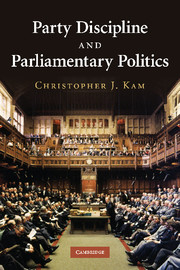Book contents
- Frontmatter
- Contents
- List of figures
- List of tables
- Acknowledgements
- 1 Introduction
- 2 A model of intra-party politics
- 3 Patterns of backbench dissent in four Westminster parliamentary systems, 1945–2005
- 4 Policy preferences and backbench dissent in Great Britain and Canada
- 5 Dissent, constituency service, and the personal vote in Great Britain and New Zealand
- 6 The cost of dissent to the party
- 7 Demotion and dissent in the Canadian Liberal Party, 1991–1997
- 8 Discipline and dissent in the Australian Coalition, 1996–1998
- 9 Career trajectories, socialization, and backbench dissent in the British House of Commons
- 10 Conclusion
- Appendix 1 Comparative statics and proofs
- Appendix 2 Content and construction of ideological scales
- Appendix 3 Sampling and coding of media dissent and discipline
- Appendix 4 Demotion and the parliamentary careers of Canadian MPs
- References
- Index
4 - Policy preferences and backbench dissent in Great Britain and Canada
Published online by Cambridge University Press: 03 July 2009
- Frontmatter
- Contents
- List of figures
- List of tables
- Acknowledgements
- 1 Introduction
- 2 A model of intra-party politics
- 3 Patterns of backbench dissent in four Westminster parliamentary systems, 1945–2005
- 4 Policy preferences and backbench dissent in Great Britain and Canada
- 5 Dissent, constituency service, and the personal vote in Great Britain and New Zealand
- 6 The cost of dissent to the party
- 7 Demotion and dissent in the Canadian Liberal Party, 1991–1997
- 8 Discipline and dissent in the Australian Coalition, 1996–1998
- 9 Career trajectories, socialization, and backbench dissent in the British House of Commons
- 10 Conclusion
- Appendix 1 Comparative statics and proofs
- Appendix 2 Content and construction of ideological scales
- Appendix 3 Sampling and coding of media dissent and discipline
- Appendix 4 Demotion and the parliamentary careers of Canadian MPs
- References
- Index
Summary
In the British case, this means inspecting more carefully the hypothesis that even in peak periods of the Westminster model legislative parties only appeared to be strong because their members had homogeneous preferences.
(Krehbiel 1993, p. 260)Introduction
Do parties force or entice their members to vote together in spite of their disagreements about policy, or do party members vote together because they already agree over policy? The high levels of cohesion displayed by parliamentary parties tend to discourage students of parliamentary politics from asking this question. There is, perhaps, an underlying assumption that if parliamentary parties are highly cohesive, it must be because they can and do enforce discipline. For Krehbiel (1993, 1999), however, the answer to this question is not clear a priori, and the inferential link between policy preferences and discipline, on the one hand, and individual loyalty and party unity, on the other, not necessarily correct; MPs' voting behaviour could just as well be determined by their ‘preferenceship’, that is, by their ideological proximity to various voting coalitions in the chamber, as by their party affiliation.
There is a temptation to dismiss preferenceship out of hand as an abstraction that is too far removed from the realities of parliamentary politics to yield valuable insights; this temptation should be resisted. Preferenceship, after all, is less a comprehensive model of legislative politics than a starting-point for further investigation.
- Type
- Chapter
- Information
- Party Discipline and Parliamentary Politics , pp. 75 - 102Publisher: Cambridge University PressPrint publication year: 2009



